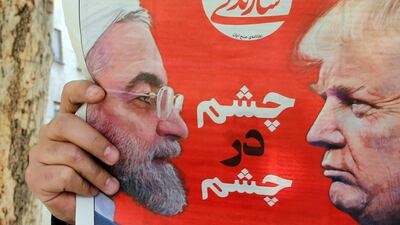For the first time, the US has designated a country's army as a terrorist group. Iran's Islamic Revolutionary Guard Corps is now on the US foreign terrorist organisations list, along with the likes of ISIS and Al Qaeda.
In an unprecedented move, US President Donald Trump has recognised that the IRGC “actively participates in, finances and promotes terrorism as a tool of statecraft”.
The IRGC purports to act as a defence force for Iran and its leaders but its malignant reach extends beyond the country’s borders and its claim to act in the interests of national security.
Via the murky activities of the Quds Force, the unit responsible for operations on foreign soil, the armed forces support Iran's proxies in the Middle East, including armed militias like Hezbollah in Lebanon and the Houthi rebels in Yemen.
An Iranian presence is also pervasive in Syria. Adding the IRGC to the watchlist is a significant step and should act as a deterrent for organisations which enable Iran and its proxies to carry out their expansionist agenda.
It also sends a strong message to the EU, which has indicated it wants to salvage some part of the 2015 nuclear deal, despite the US pulling out last year.
However, with Tehran so firmly embedded in the politics of some of its regional neighbours, sanctioning those under its influence comes with difficulties. US sanctions on a wide number of groups and individuals demonstrate the difficulty of isolating and punishing those directly supported by Tehran without having a more detrimental and wider impact on innocent parties.
Citing the IIRGC as a terrorist group is undoubtedly an escalation in US-Iran relations. Tehran has already retaliated by declaring the US Central Command a terrorist organisation.
Meanwhile, Israeli Prime Minister Benjamin Netanyahu is attempting to commandeer the decision as one that is pro-Israeli in an attempt to garner votes. This has enabled Iranian Foreign Minister Mohammad Javad Zarif to portray itself as a bulwark against Israel and a protector of Muslim nations.
But the US move cannot be circumscribed to Israeli politics. The Quds Force’s malevolence threatens countries across the wider region, from Egypt to Iraq and Afghanistan. Arab states have been warning of its harmful incursions for years. Saudi Arabia and Bahrain even added the Revolutionary Guard to their own terrorism lists in October last year, long before Mr Trump.
The US’s tough stance on Iran cannot work in isolation; it must be followed by concerted international efforts to rein in terror where it threatens to destabilise an entire region.
That kind of co-ordinated approach can work, as was demonstrated when Mr Trump expanded sanctions on foreign entities supporting Hezbollah last year and the UK outlawed the group.
As a result, Hezbollah is now pleading for donations and has even resorted to crowdfunding as it starts to feel the pinch.
Sanctions can only go so far, but a consistent and sustained approach in calling out terror groups are essential for regional stability. There needs to be de-escalation in the region but the first step must come from Iran.

